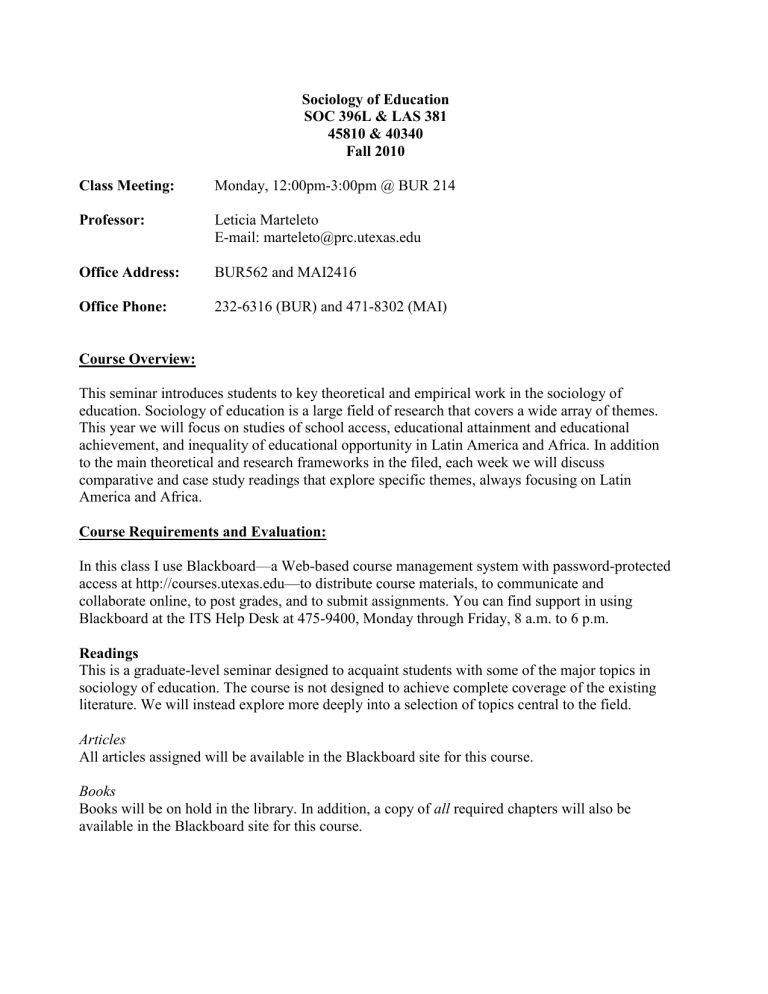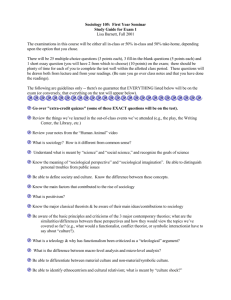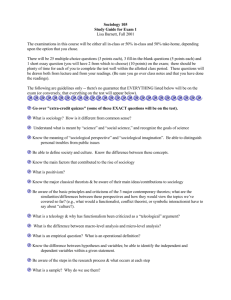File

Sociology of Education
SOC 396L & LAS 381
45810 & 40340
Fall 2010
Class Meeting:
Professor:
Monday, 12:00pm-3:00pm @ BUR 214
Leticia Marteleto
E-mail: marteleto@prc.utexas.edu
Office Address:
Office Phone:
BUR562 and MAI2416
232-6316 (BUR) and 471-8302 (MAI)
Course Overview:
This seminar introduces students to key theoretical and empirical work in the sociology of education. Sociology of education is a large field of research that covers a wide array of themes.
This year we will focus on studies of school access, educational attainment and educational achievement, and inequality of educational opportunity in Latin America and Africa. In addition to the main theoretical and research frameworks in the filed, each week we will discuss comparative and case study readings that explore specific themes, always focusing on Latin
America and Africa.
Course Requirements and Evaluation:
In this class I use Blackboard
— a Web-based course management system with password-protected access at http://courses.utexas.edu—to distribute course materials, to communicate and collaborate online, to post grades, and to submit assignments. You can find support in using
Blackboard at the ITS Help Desk at 475-9400, Monday through Friday, 8 a.m. to 6 p.m.
Readings
This is a graduate-level seminar designed to acquaint students with some of the major topics in sociology of education. The course is not designed to achieve complete coverage of the existing literature. We will instead explore more deeply into a selection of topics central to the field.
Articles
All articles assigned will be available in the Blackboard site for this course.
Books
Books will be on hold in the library. In addition, a copy of all required chapters will also be available in the Blackboard site for this course.
Assignments and Evaluation
Students will be evaluated on the basis of several assignments (described below) and class attendance and participation. All written assignments should be in Microsoft Word format and typed in 12-point font, preferably Arial or Times New Roman.
1.
Attendance, preparation and participation: Attendance and tardiness is used in determining the grades. Readings and discussions are a crucial part of the course. Students are expected to complete all readings, and participate actively and thoughtfully in class discussions. All students are expected to complete all the required readings before the class period for which they are assigned and to come to class prepared to discuss them.
2.
Analytical memos (2 pages or less): Students will choose a group of weeks to write their memos based on that week’s readings: (1) 3, 5, 7, 9, 11, 13 or (2) 2, 4, 6, 8, 10, 12. These memos will provide an opportunity for students to offer critical commentary and to pose questions for in-class discussion on the assigned readings. Memos should address at least one of the following questions: What are the main questions addressed in the readings?
What are the conceptual strengths and weaknesses of the articles? What is the value of the analyses of the readings for the field? Memos should also contain at least three questions to promote in-class discussion. These memos are due midnight the Saturday before class on Monday on the Blackboard site for this course. No late memos will be accepted.
3.
Discussion leader: Students will be assigned to lead a 40/45-minute discussion integrating the week’s readings to a n assigned country . Students will lead this activity once during the course and should frame their discussion based on the guidelines on page
11. Students should send me their top two preferences in rank order in the first day of class and I will assign students on that basis. The presentation materials should be posted on the Blackboard class website by midnight the Friday before class on Monday.
4.
Final project: Students are asked to present their final project in two forms: (1) a 15-20 minute in-class presentation and (2) a written research proposal (not to exceed 15 doublespaced pages). Students are asked to submit a written outline of their final project by midnight on October 14. The final written assignment is due by 2pm on December 13th.
The final project should include an extensive review of the literature on the topic, clear hypotheses/research questions, justification of the proposed research and relevance of the potential findings. The proposal should also contain a detailed description of the data and methods that will be used. The final project for this class might serve as the basis of a dissertation proposal, a grant proposal to support dissertation work or a paper for a conference and journal publication.
We will spend time in class during the semester discussing the nature of the final project.
Students will also meet in groups during class to provide and receive feedback on their final project. I am available to discuss your final projects during office hours and by appointment.
Evaluation
Grades will be calculated as follows:
Class attendance, participation and preparation
Analytical memos
Discussion leader
Final project
Outline (5%) + Final paper (40%)
10%
25%
20%
45%
Week 1 (08/30): Introduction and Overview
Reminder: Analytical memos are due by midnight Saturday on the Blackboard website for this course. Students should submit memos according to the group of weeks they selected:
(1) or (2).
Theoretical perspectives, research frameworks and overall patterns of education in Latin America and Africa (weeks 2, 3 and 4)
Week 2 (09/13): Theoretical perspectives and research frameworks
Required readings:
Buchmann, C. and E. Hannum. 2001. “Education and Stratification in Developing
Countries: Review of Theories and Empirical Research.”
Annual Review of Sociology
27:77-102.
Bray, M. and R. Thomas. 1995. “Levels of Comparison in Education: Different Insights from Different Literatures and the Value of Multilevel Analysis.”
Harvard Educational
Review 65(3): 472-490.
Carnoy, M. 2007.
Cuba’s Academic Advantage: Why Students in Cuba Do Better in
School . Stanford: Stanford University Press. Chapter 1.
Sadovnik, A. 2007. “Theory and Research in the Sociology of Education”. In A. Sadovnik
(ed.) Sociology of Education: A Critical Reader.
New York: Routledge.
Week 3 (09/20): Education in Latin America
Required readings:
Carnoy, M. 2007.
Cuba’s Academic Advantage: Why Students in Cuba Do Better in
School . Stanford: Stanford University Press. Comparing academic performance in Cuba and other Latin American countries. Chapters 2, 3 and 4.
Hyunjoon, P. and G. Sandefur. 2006. “Families, Schools, and Reading in Asia and Latin
America.” In E. Hannum and B. Fuller. Children's Lives and Schooling across Societies:
Research in the Sociology of Education v. 15.
Torche, F. 2010. “Economic Crisis and Inequality of Educational Opportunity in Latin
America”
Sociology of Education 83(2): 85-110.
Week 4 (09/27): Education in Africa
Required readings:
Buchmann, C. 2002. "Getting Ahead in Kenya: Social Capital, Shadow Education and
Achievement." Research in Sociology of Education 13:133-59.
Case, A., C. Paxson, and J. Ableidinger. 2004.
“Orphans in Africa: Parental death, poverty and school enrollment.”
Demography 41(3): 483-508.
Hewett, P. and C. Lloyd. “Progress toward education for all: Trends and current challenges for Sub-Saharan Africa” In Lloyd, C. (editor), The Changing transitions to adulthood in developing countries . Washington DC: The National Academies.
Families, schools, access to schooling and educational outcomes (weeks 5, 6 and
7)
Week 5 (10/04): Is it schools or is it families? Or both? School effects and family effects
Required readings:
Baker, D. and G. LeTendre. 2005. “Symbiotic institutions: Changing global dynamics between family and schooling” in Baker and LeTendre.
National Differences, Global
Similarities World Culture and the Future of Schooling . Stanford: Stanford University
Press.
Buchman, C. 2002. “Measuring Family Background in International Studies of Education:
Conceptual Issues and Methodological Challenges” in A. Porter and A. Gamoran
(editors).
Methodological Advances in Cross-National Surveys of Educational
Achievement.
National Research Council. Washington DC: National Academy Press.
Epstein, J. and M. Sanders. 2000. “Connecting home, school, and community: new directions for social research.” In M. Hallinan. Handbook of the Sociology of Education.
Springer.
Week 6 (10/11): Family factors and educational outcomes
Required readings:
Arends-Kuenning, M. and Duryea, S. 2006. “The Effect of Parental Presence, Parents'
Education, and Household Headship on Adolescents' Schooling and Work in Latin
America.”
Journal of family and economic issues 27(2): 263-87.
Buchmann, C. 2000. "Family Structure, Parental Perceptions and Child Labor in Kenya:
What Factors Determine Who is Enrolled in School?" Social Forces 78:1349-78.
Lloyd C., Blanc A. 1996. “Children’s schooling in sub-Saharan Africa: The role of fathers, mothers, and others.”
Population and Development Review 22(2):265–298
Vegas, E. and Petrow, J. 2008. Raising student learning in Latin America: The challenge for the 21 st
century. Washington DC: The World Bank. Chapter 5.
Reminder: Deadline for submitting an outline of the final project is 10/18
Week 7 (10/18): School factors and educational outcomes
Required readings:
Case, A. and A. Deaton. 1999. “School inputs and educational outcomes in South Africa”.
Quarterly Journal of Economics, 114( 3): 1047-84.
Lee, V., T. Zuze and K. Ross. 2005. “School Effectiveness in 14 Sub-Saharan African countries: Links with 6 th graders’ educational achievement.” Studies in Educational
Evaluation 31: 207-46.
Somers, M., P. McEwan and D. Willms. 2004. “How effective are private schools in Latin
America
?” Comparative Education Review
48(1): 25-52.
Torche, F. 2005. “Privatization reform and inequality of education opportunity: The case of Chile”.
Sociology of Education 78(4): 316-343.
The interactions between education, vital events and work (week 8)
Week 8 (10/25): Schooling and the transitions to adulthood
Required Readings:
Biddlecom, A., Gregory, R., C. Lloyd, and B. Mensch. 2008. "Associations Between
Premarital Sex and Leaving School in Four Sub-Saharan African Countries." Studies in
Family Planning , 39(4):337-350.
Hannum, E. and B. Fuller. 2006. “Overview: Children’s Lives and Schooling across
Societies.” E. Hannum and B. Fuller (editors)
Research in Sociology of Education 15:
Children
’ s Lives and Schooling across Societies.
Boston: JAI/Elsevier Science.
Lloyd, C .
, C. Kaufman and P. Hewett. 2000. “The spread of primary schooling in sub-
Saharan -
Africa: Implications on fertility change.”
Population and Development Review.
26(3): 483-515.
Marteleto, L., D. Lam and V. Ranchhod. 2008. “Sexual Behavior, Childbearing and
Schooling in Urban South Africa.”
Studies in Family Planning 39(4):351-368.
Education and Inequalities (weeks 9, 10 and 11)
Week 9 (11/01): Education, stratification and social mobility
Required readings:
Blossfeld, H. and Y. Shavit. 1992. “Persisting Barriers: Changes in Educational
Opportunities in Thirteen Countries.” In: Shavit, Y and H-P Blossfeld (eds), Persisting
Barriers: A Comparative Study of Educational Inequality in Fourteen Countries.
Boulder:
Westview.
Breen, R. and J. Jonsson. 2005. “Inequality of Opportunity in Comparative Perspective:
Recent Research on Educational Attainment and Social Mobility.”
Annual Review of
Sociology 31: 223-43
Farrell, J. and E. Schiefelbein. 1985. “Education and Status Attainment in Chile: A
Comparative Challenge to the Wisconsin Model of Status Attainment.” Comparative
Education Review 29(4): 490-506.
Torche, F. and C. Costa-Ribeiro. 2010. “Pathways of Change in Social Mobility:
Industrialization, Education and Growing Fluidity in Brazil”, Research in Social
Stratification and Mobility.
Week 10 (11/08): Education and gender
Required readings:
Assié-Lumumba, N. and M. Sutton. 2004. “Global Trends in Comparative Research on
Gender and Education.”
Comparative Education Review 48(4): 345-352.
Fuller, B. and X. Liang. 1999. “Which girls stay in school? The influence of family economy, social demands, and ethnicity in South Africa.” In C. Bledsoe, J. Casterline, J.
Johnson-Kuhn and J. Haaga Critical Perspectives on Schooling and Fertility in the
Developing World . Washington DC: National Academy Press pp. 181-215.
Lloyd, C .
, M. Grant, and A. Ritchie. 2008. “Gender differences in time use among adolescents in developing countries: Implications of rising school enrollment rates”
Journal of Research on Adolescence . 18(1): 99–120.
Ma, X. 2008. “Within-School Gender Gaps in Reading, Mathematics, and Science
Literacy.” Comparative Education Review 52(3): 437-460.
Week 11 (11/15): Education and Race and ethnicity
Required readings:
Hannum, E. 2002. “Ethnic Differences in Basic Education in Reform-Era Rural China.”
Demography . 39: 95-117.
Kao, G. and J. Thompson. 2003. “Racial and Ethnic Stratification in Educational
Achievement and Attainment.” Annual Review of Sociology 29: 417-442.
McEwan, Patrick. 2008. “Can schools reduce the indigenous test score gap? Evidence from Chile.”
Journal of Development Studies 44(10): 1506-30.
McEwan, Patrick. 2004. “The indigenous test score gap in Bolivia and Chile.” Economic
Development and Cultural Change 53(1): 157-90.
Weeks 12 & 13 (11/22 & 11/29): Student Presentations
Final paper due by noon on December 6th
Deposit: Instructor Mailbox in the Sociology Department AND Blackboard Site
NO LATE PAPERS WILL BE ACCEPTED
Only written statements from the appropriate UT office or a doctor’s letter are accepted for late assignments. For documentation of emergencies, the appropriate UT office to contact is
Student Emergency Services in the Office of the Dean of Students at 471-5017.
Laptop and cell phone use policy: Laptops may be used only for taking lecture notes. No other use of laptops will be allowed. Cell phones should be silenced or off.
Important University Notices and Policies
University of Texas Honor Code
The core values of The University of Texas at Austin are learning, discovery, freedom, leadership, individual opportunity, and responsibility. Each member of the university is expected to uphold these values through integrity, honesty, trust, fairness, and respect toward peers and community.
Use of E-mail for Official Correspondence to Students
E-mail is recognized as an official means of communication from the University to students; therefore, you are responsible for reading your e-mail for university and course-related information and announcements. You are responsible to keep the university informed about changes to your e-mail address. You should check your e-mail regularly and frequently—I recommend daily, but at a minimum twice a week—to stay current with university-related communications, some of which may be time-critical. You can find UT Austin’s policies and instructions for updating your e-mail address at http://www.utexas.edu/its/policies/emailnotify.php
Documented Disability Statement
Students with disabilities who require special accommodations need to get a letter that documents the disability from the Services for Students with Disabilities area of the Office of the Dean of
Students (471-6259 voice or 471-4641 TTY for users who are deaf or hard of hearing). This letter should be presented to the instructor in each course at the beginning of the semester and accommodations needed should be discussed at that time. Five business days before an exam the student should remind the instructor of any testing accommodations that will be needed.
Religious Holidays
Religious holy days sometimes conflict with class and examination schedules. If you miss an examination, work assignment, or other project due to the observance of a religious holy day you will be given an opportunity to complete the work missed within a reasonable time after the absence. It is the policy of The University of Texas at Austin that you must notify each of your instructors at least fourteen days prior to the classes scheduled on dates you will be absent to observe a religious holy day.








